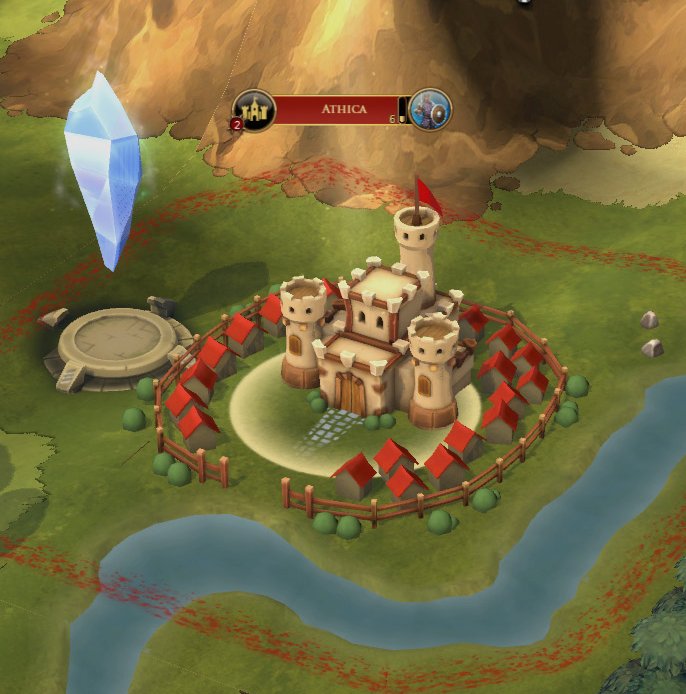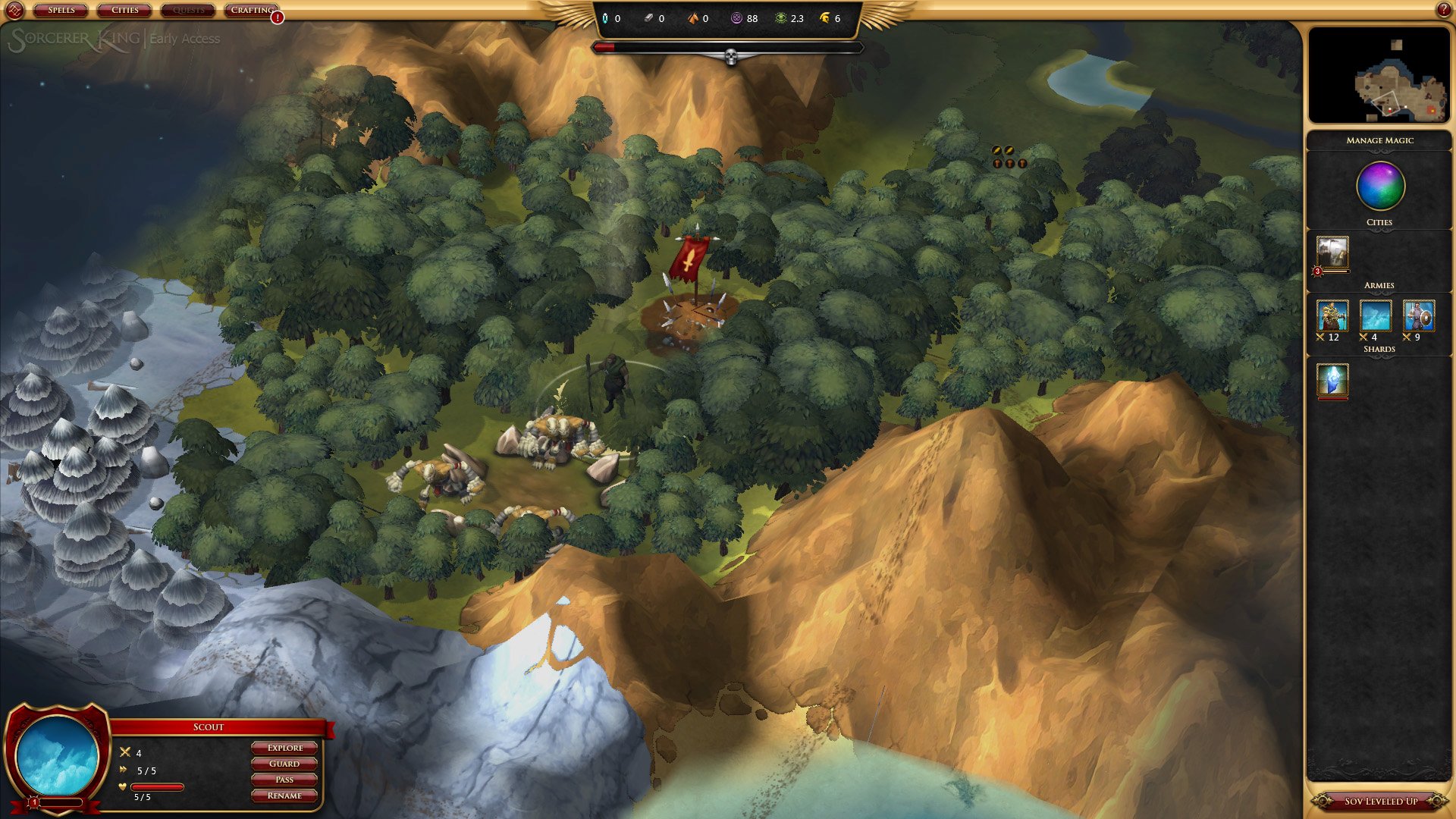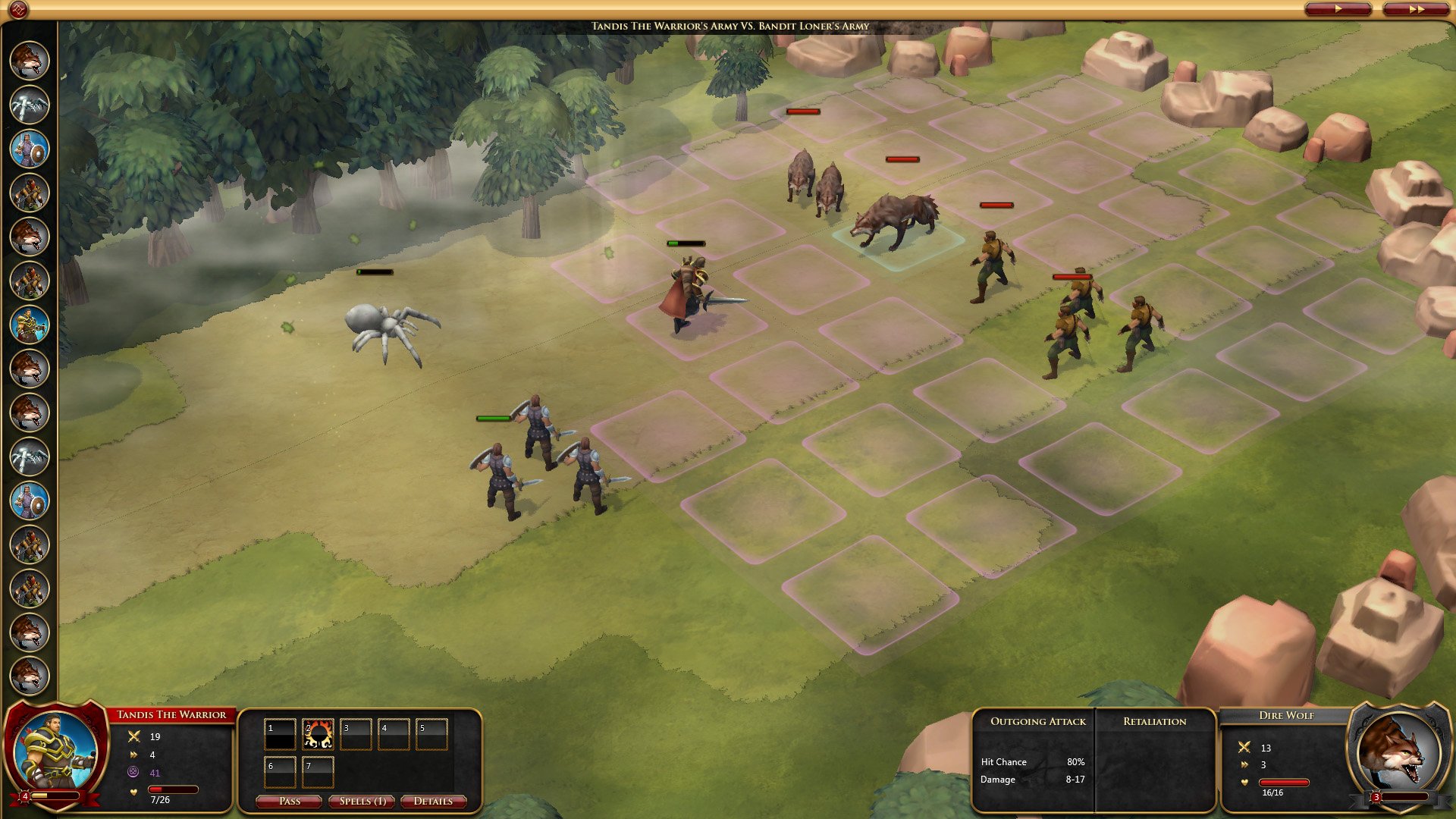Sorcerer King: fresh 4X strategy from Stardock

Sorcerer King begins where most of my strategy game campaigns end: with brutal defeat and someone else conquering the world. Really, it’s an Early Access game about being late to the party; arriving in a ruined world of shattered empires and unleashed monsters, where the balance of power has shifted to the point that you and the Sorcerer King may as well be playing completely different strategy games.
“Yeah. He’s playing a regular 4X game. It’s his game. His name’s on the box. You’re a minor race in his game,” explains Brad Wardell, Stardock founder and Sorcerer King’s Lead Designer. “Your job is to go rebuild as much as you can, recruit the remnants of the factions you’d normally be competing with, and then take him out before he can become a god.”
In practical terms, that means starting with one city and a soldier, then exploring outwards. In the meantime the Sorcerer King is destroying magical shards scattered around the map, gathering allies among the same people you’re trying to woo, and driving a Doomsday Counter closer to victory. As it rises—and it can rise exponentially fast later in the game if things start snowballing—the world gets more dangerous and the challenges get tougher. You'll have to work to make sure your armies and friends are powerful enough to meet the rising challenge.

It’s not quite that simple though. The Sorcerer King has an invisible director charged with keeping things fun. Wardell explains, “For the last year, I’ve been making basically a Dungeon Master, whose job is to make sure the player is entertained by looking at what’s going on and amplifying it, and that come back to help or bite you. It is a problem with 4X games. You usually know two hours before if you’ve won. Here we want that time to be as short as possible.”
Wardell’s DM isn’t quite what it sounds. It doesn’t cheat by sprinkling in more enemies on either side, or by ramping the difficulty up or down directly. it works as more of a co-ordinator that can manipulate a pile of variables to subtly guide the game. Late in a campaign, for instance, it won’t even bother asking if you want to fight enemies that are no threat to your armies, it will just quietly dispose of them like a polite butler. At other times, it’s more overt.
"The Sorcerer King has an invisible director to keep things fun"
“Imagine I’m playing the game and I’m doing really well,” explains Wardell. “That means that when I go on quests I’ll get extra options. Most of the interactions comes in the form of quests, Star Control or FTL style, where you get situations and choices. The DM has a lot of control over those and what you get, based on past decisions. For instance, and this isn’t in the beta yet, if I’ve made friends with Dwarves, their enemies the Ice Lords are going to hate you. If they’re next to you, you probably shouldn’t have done that. The DM’s job is to make sure that what happens with them all happens as it should. It’s not just that they’ll gang-rush you if you’re losing or buddy up if you’re winning.”
Along with the strategic map, those quests are the main way to influence the world, and an added time pressure given that both you and the Sorcerer King want them. Actually he wants you too, though his idea of alliance is an instant game-over heralding lifetime of slavery, and so not the wisest path. He can cut other deals, however, like offering a fancy Ring of Strength in exchange for advancing the Doomsday Counter a a little, that can balance things out a little.
Keep up to date with the most important stories and the best deals, as picked by the PC Gamer team.
Quests are multiple choice affairs, and with the expected Stardock tongue-in-cheek tone—for this game Wardell hired a Cracked.com writer, so probably expect at least one “10 Great Reasons To Ally With The Dwarves”. His job is to make a ‘jillion’ quests to keep things fresh over the course of many, many games.

“We’ve also made an editor we hope to release so that people using Steamworks can make their own,” adds Wardell. “It’s all XML. Anyone can define a resource, like, uh-“ Bottle of Bees? “Yeah! And then make quests based on that.”
What makes this even more interesting though is that Wardell is very aware of the importance of writing, and not just in random gags or irrelevant bits of flavour text. As well as citing the narrative-driven Star Control 2 as an inspiration, it only takes a minor mention to get him started on the genius of Alpha Centauri—not even arguably the most personality driven 4X game ever made, but the undisputed king.
“Oh my god. Not enough has been written about Alpha Centauri and why it’s so important. There should be doctoral theses on that game. If you take out the writing, it’s a actually fairly standard 4X game, but because of that, and that attention to detail, people just look so fondly on it. That’s a big reason we hired a professional writer - to give our game a texture beyond the mechanics. Our games have been accused of being a little soulless at times, but we want to make games that are really full of personality and that really make you feel like you’re having fun with a friend. The leaders in AC… you really felt like you were connecting to them, and that was just with If… Then type logic. These days, we can data-drive so much more, make conversations and interactions just so more sophisticated than those machines could ever have managed.”
"It’s all XML. Anyone can define a resource"
As a fan of Alpha Centauri, this is a great thing to hear. GalCiv is one of the few strategy games that has even tried to match the master, not least some of the with the greatest diplomacy messages ever, but most of AC's successors have failed to match its clever worldbuilding. It’s been very disappointing, and often leaves strategy games especially feeling very impersonal.
“Not only is that in my opinion very accurate, but I know the reason why,” sighs Wardell. “It’s to do with changes to the industry in total. When we had (big personality driven) games like, say, Wing Commander, that was a privately owned company. Companies these days are public, and—I don’t want to be anti-corporate here—but public companies have dates that things have to be out, and these things take so much time to do. For Civ 5, they just didn’t have time. For other games, no time. It’s only recently that people have really started to appreciate writers."
"I’m guilty of that too. I wrote every bit of text in GalCiv 2 and I have no business doing that. Lately though, we’ve brought in professional writers and editors and so on, and it amazes me how people don’t realise how important even things like basic editing are.”

